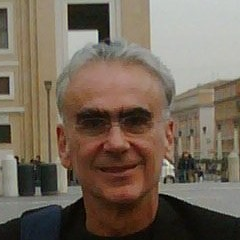Puccini is Calaf and vice versa in Marco Arturo Marelli’s Turandot... and that’s not the only surprise in his production at the Wiener Staatsoper. Instead of downtrodden Beijing residents, opera-goers in ball dress make up the chorus, while Ping, Pang and Pong double as morgue workers stacking the heads of the princess’ suitors who failed to answer her riddles – and died for it. Which is not to infer that all is unconventional. Tumblers and ribbon dancers dressed in chinoiserie populate the stage at appropriate moments. The headman whets his sword on a grinding wheel; and Liù dies by her own hand, a knife deep in her chest. Still, Marelli serves up plenty of Regietheater. The good news is that the risks pay off.
There is little of the opulence of a Zeffirelli production. What we see instead, is fast-changing scenery on a moving stage and clever ideas from the score’s opening bars. The curtain rises on the composer. Notating at the piano he gets up, opens the lid of a music box, and the first tinkling notes sound of the soon to be heard piccolo theme. The action moves thereafter away from Puccini’s villa, only to return in the third act, and lo and behold: the composer and Calaf – the prince who wins the hand of Princess Turandot – are suddenly one and the same. And both are Roberto Alagna.
Calaf’s big musical moment is “Nessun dorma” and Alagna literally rose to the occasion, his final high B seemingly effortless and held well into the applause that rewarded his efforts. But he was fine beyond the opera’s signature area as well, his voice pithy or lyrical, as called for.
As Turandot, Elena Pankratova delivered the big sound the role requires. Her high notes were icy – chilling contrast to the warmth of her timbre as she confessed her love for the prince who succeeded in melting her heart. “In questa reggia”, the aria revealing Turandot’s reasons for her hatred of her suitors, has its perils is in rhythm as well as shading, yet Pankratova made it sound near effortless.
There was visual drama aplenty as well, and not only between her and Alagna. Her interplay with Liù, the slave girl, is a meeting of polar opposites. Where Turandot is first ice then molten passion, Liù is in love of another sort, the unrequited kind to Calaf and that of devotion to her life’s end to Timur, Calaf’s aged father, the king of Tartary.
Liù has just two arias, but Golda Schultz rendered them with an ardency that made her the most memorable – and believable – persona of a generally pleasurable evening. Timur was well sung by Ryan Speedo Green, while Boaz Daniel, Carlos Osuna and Leonardo Navarro gave respectable performances as the royal counsellors Ping, Pang and Pong. Benedikt Kobel took the role of Altoum, the aged emperor; here in a wheelchair, as befits one well on the way to fulfilling his subjects’ wish of 10,000 years of life.
Turandot is among Puccini’s most complex scores. But conductor Ramón Tebar and the State Opera Orchestra rose to delivering its complex colours and textures with hints of Ravel and Debussy, his only fault being rare instances of orchestral overkill at some of the more sonorous moments in the score that occasionally challenged the vocal capacities of all but Pankratova and Alagna.




